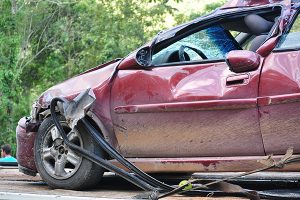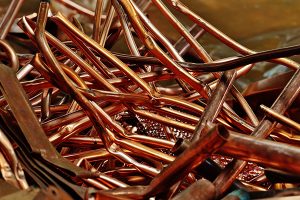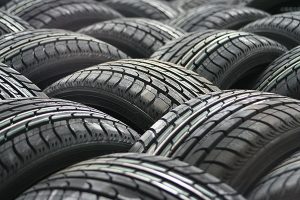Strong, durable, anti-bacterial and aesthetic are just a few of the many qualities to describe metal. Utilised as a building material, packaging staple and engineering innovator for centuries, the use of metal has dramatically revolutionised our way of life. Metal not only has changed our past and influenced our present, but it can also affect our future too. A majority of metals can be fully recycled which, when coupled with the increasing documentation and evidence surrounding climate change, can decrease the need for virgin materials to be produced. The constant mining of metal ores is not sustainable, as the machines used contribute to rising greenhouse gas emissions and also the mining damages the natural landscape.
However, metal recycling has been occurring for decades, with statistics suggesting that 40% of worldwide steel production is made using recycled steel. But how does a recycled metal product get made? Whether for interiors, construction or engineering, we take a closer look at how a recycled metal product is made below.
Recycling Bin and Waste Disposal
From chopped tomato cans to Heinz beans cans, canned fruit, vegetables and sauces are a staple in our everyday cupboards. Constructed from aluminium, these cans can preserve food for years and these produce can be easily whipped into an array of delicious meals.
However, you must make sure to separate your waste from recyclables to non-recyclables, especially for aluminium cans. Infact, throwing away a single aluminium into the general waste bin can waste the same amount of energy as a can filled with gasoline. Aluminium cans can be made into a variety of new products, so it is vital that we dispose of them properly.
Once your recyclables have been picked up by the local council, they are sent to a local recycling facility which sorts your domestic recycled products. This would most likely be plastic, cardboard, and aluminium cans. However, some councils do accept other products like textiles, electronic waste, and large wooden products, yet you need to check with your council beforehand.
The recyclables are sorted where paper is sorted first, leaving only plastics and metals. Then, an electric current is passed through which, as metal is a conductor of electricity and plastic is not, only metals get affected. This process is called Eddy Current Separation. Once the recyclables have been initially sorted, the metals are then sorted further into steel and aluminium products. These are done using magnets which sort the metals. These are then sent to UK markets in Derby, South Yorkshire, Swansea and Essex.
If precious metals like palladium, platinum, gold, copper, lead and silver are in the mix, more technologically advanced and sophisticated methods need to be utilised to sort these, especially if they are economically viable. In large recycling facilities, sensors using infra-red scanning and x-ray are used to sort these metals. Other common metal sensing methods include biotechnology, hydrometallurgy, and pyrometallurgy.
There are many modern recycling technologies that have revolutionised and streamlined the metal recycling process. However, there is still a need for more sustainable methods for recycling to be used more widely. Separating ferrous metals from non-ferrous metals is one of the most important steps in the recycling process. Ferrous metals are defined by possessing iron, so they can be easily attracted through the use of magnets. In scrap yards, large pieces of ferrous metal are pulled out by cranes with an electromagnet fitted.
Industrial, Agricultural and Scrap Metal
It is not just domestic products that can be recycled, industrial, agricultural and scrap cars can also be made into products. These are often sold to scrap metal merchants and collectors who then sell on to recycling facilities, dealerships and private buyers who want to use the products to perhaps refurbish a car.
Once the metals have been sorted, they are then processed through shredding. Shredding is done to help speed along the recycling and recreating process as shredded metal has a large surface to volume ratio, meaning that it can be melted easier and using less energy.
Once the metal has been shredded, the scrap metal is melted in a large furnace. Different furnaces are designed to suit different needs. The energy used to melt the scrap metal is considerably less than the energy used to mine for raw materials – discrediting a misconception that recycling is no better than mining for a new product.
Depending on the size of the product and the heat of a furnace, metal can be fully melted from a few minutes to a few hours. Then, the metal needs to be purified. The majority of recycled metal is purified using electrolysis, also known as electrolytic refining. Other methods also are distillation and liquidation.
Electrolytic refining is a complex process where a thick block of impure metal is made anode, a positively charged electrode, and a thin block of pure metal is made cathode, a negatively charged electrode. These are both placed in an electrolyte solution which is usually a form of sulphate and an electric current is passed between both the anode and cathode. As the current is passing, pure metal from the electrolyte solution deposits onto the cathode, and an equal amount of impure metal dissolves from the anode and into the electrolyte solution. These soluble impurities settle below the anode and is called anode mud.
Solidifying and Transportation
Once the metals have been purified, they are carried by a conveyor belt to cool and solidify. During this, the scrap metal is formed into specific shapes like bars that can be easily used for the production of the future metal product.
Once the metals are cooled and solidified, they are ready. At this point, the metals are transported to factories where they are used as a raw material for the production of new products.
Popular products made from recycled scrap metal
As previously mentioned, metals from aluminium to copper, steel to brass can be reused and recycled many times to make new products without decreasing in durability, strength and aesthetic appeal. Below are the most popular products and industries that benefit from recycled scrap metal.
From aeroplanes to automobiles, plumbing to household appliances, a variety of things that we rely on for our daily livelihood can be made using recycled scrap metal. A high concentration of scrap metal is sent to the manufacturing industry and is also used in industrial means too. This is because these industries need their products to have longevity, be extremely durable and weatherproof, and also be anti-bacterial and resistant to erosion.
Affordable and long-lasting, as mentioned previously canned goods are a staple in our kitchens and pantries. Recycled aluminium and steel are commonly reused as new food packaging, with a majority of brands and canned goods containing a percentage of recycled material. In fact, many brands pride themselves on using 100% recycled products in their packaging. This is because using recycled product is more cost-effective than buying virgin materials.
Although canned products are the most widely made product for recycled metal, in fact, there are many smaller independent brands that are also using recycled products for beauty packaging and steel water bottles.
Bought by individual makers, creators and brands, recycled scrap metal can be made into components for the home like furnishings, fixtures, lighting, decorative artwork, and sculpture. In addition, you can also find recycled scrap metal jewellery too.
As New Auto Recyclers, Scrap Metal Merchants Offering Quality Scrap Metal Prices in Newcastle
If your car has failed it’s MOT or been in an accident and you don’t want to pay lots of money to have it fixed, why not have it scrapped? Here at As New Auto Recyclers, we offer quick same day payouts for your van, motorbike, scooter, 4×4, and caravette.
Alongside scrapping cars, we also sell high-quality scrap metal and car parts too. We pride ourselves on being an eco-friendly solution to your old vehicle or if you are renovating a new motor. Following strict UK legislation, being DVLA approved and offering a fair competitive price, we want to be your first choice if you are based in Newcastle, Northumberland or Tyneside.
To find out more about our services, simply contact us today.





